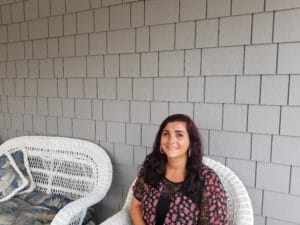While still in middle school, Katelyn was introduced to alcohol, marijuana, and prescription medication. “I was always the youngest of the kids I was hanging around with in the neighborhood,” shares Katelyn. “So I would just try anything to go along with what everyone in the group was doing.”
As Katelyn got older, her substance use escalated and included cocaine and heroin. Katelyn’s mother battled addictions of her own while working to support her household. Drugs brought companionship, but they also brought a cycle of addiction, short-term treatment programs, and incarceration. As a youth offender, Katelyn was in and out of behavioral group homes to try to help her addiction. “I was not learning or doing the right things…I was just learning to hide my drug use better.”
When she was seventeen, Katelyn’s drug use led to felonies. “Even with prison sentences over my head, I just couldn’t stop using drugs,” she shares. “Then my mom passed away. My aunt stepped in. She was always there for me. She tried to help me, but I couldn’t stop using. My aunt told me she was relieved whenever I was in prison. That at least I was safe there. That broke my heart, but I didn’t know what to do. I thought nothing could help me.”
Katelyn learned about TROSA from a brochure in her case manager’s office, “and something just clicked.” She was tired of the cycle of addiction and thought there had to be more to life. She scheduled her interview and was accepted to begin TROSA’s multi-year program.
At TROSA, Katelyn received the time and services to understand her drug use and behaviors and to start making healthy, long-term changes. She received free housing, meals, clothing, health care, vocational training, evidence-based counseling and therapeutic groups—“the Grief and Loss class I took was especially helpful,” shares Katelyn—and she participates in a supportive community of fellow residents, graduates, and staff dedicated to recovery.
As part of our therapeutic program, every TROSA resident has a role to play on campus and a community assignment. Through her community assignment in TROSA’s Admissions Department, Katelyn learned and practiced life skills while also making a difference in the lives of others. She answered questions about TROSA, assisted with admissions assessments, and helped people find resources.
Katelyn graduated from TROSA’s two-year program in 2021. “I really enjoy helping people like me. It’s scary to change, but the support system at TROSA helped to make that change happen. I felt safe here and I finally felt free at TROSA.” Today, Katelyn is thriving and works at a local crisis center for individuals with substance use and mental health disorders. She also enjoys a renewed connection with her family: “I call my aunt all the time. She doesn’t have to worry about me now. She’s proud of me.”

